Hello, I Ching enthusiasts! Today, let's delve into the sixth hexagram of the I Ching, Song (訟), which symbolizes 'Conflict' or 'Litigation'. It represents heaven over water, like diverging forces leading to disputes, emphasizing caution in conflicts. The hexagram statement is: "Song: Conflict. You are sincere And are being obstructed. A cautious halt halfway brings good fortune. Going through to the end brings misfortune. It furthers one to see the great man. It does not further one to cross the great water."
The line interpretations in the I Ching can be abstract and hard to remember. So, today, I've woven the six lines into an ancient tale to make them come alive. Read the story to absorb the meanings, and then in the breakdowns, I'll quote relevant parts of the story and add annotations from the I Ching original with sources. This way, you'll easily recall the lessons of each line!
Ancient Tale: 'The Village Dispute, Path to Resolution'
Once upon a time, in a village by a river under vast skies, a young man got into a heated dispute over land boundaries. He was sincere but obstructed, so he halted cautiously midway, avoiding full litigation, which brought him good fortune instead of crossing the river to pursue it aggressively.
Unable to prolong the conflict, he returned home and yielded. His household and the three hundred families in his clan escaped any blame.
Another villager, relying on old virtues for sustenance, persevered in the dispute but faced danger. In the end, he found good fortune by not seeking grand achievements, even if serving the king.
A fourth man couldn't continue the litigation; he went back, accepted fate, changed his approach, and rested in virtue, leading to good fortune.
In the center, a wise judge handled the litigation supremely, bringing great good fortune to all involved.
At the peak, even if a leather belt of honor was bestowed upon one party, by morning's end, it was snatched away three times, showing the fleeting nature of disputed gains.
How did you like the tale? Hope it was engaging! Now, let's break down each line based on the story. For each, I'll quote the matching part and annotate with the I Ching source. This connects the wisdom directly to the narrative for better recall!
Line Interpretations: Wisdom Linked to the Tale
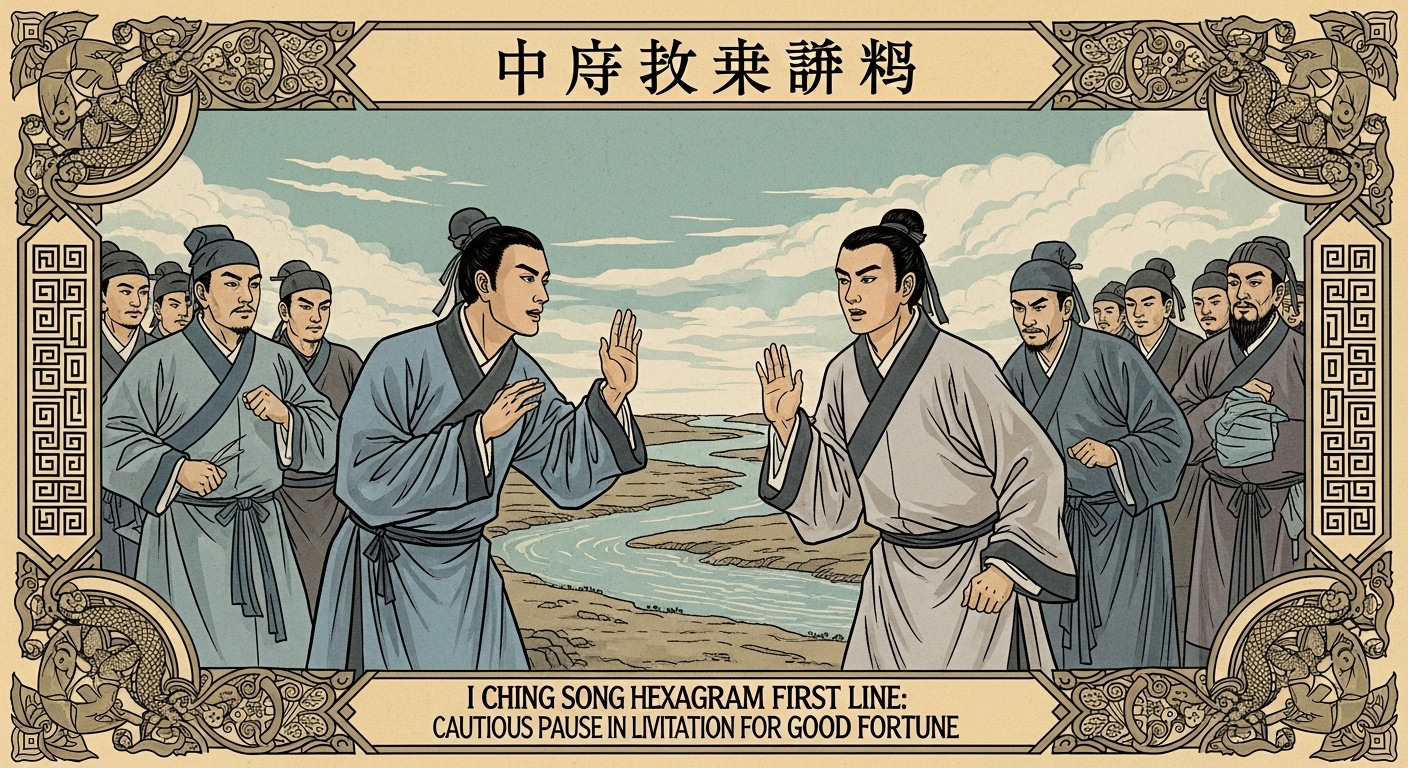
First Line (Initial Six): Has sincerity. Brings good fortune. Terminates then.
This line advises having sincerity but stopping the conflict early for good fortune.
Matching part in the tale: "He was sincere but obstructed, so he halted cautiously midway, avoiding full litigation, which brought him good fortune instead of crossing the river to pursue it aggressively."
This symbolizes pausing in conflict to avoid misfortune.
Annotation: I Ching Song hexagram first line: "The first SIX, divided, shows its subject not perpetuating the matter about which (the contention is). He will suffer the small (injury) of being spoken against, but the end will be fortunate."
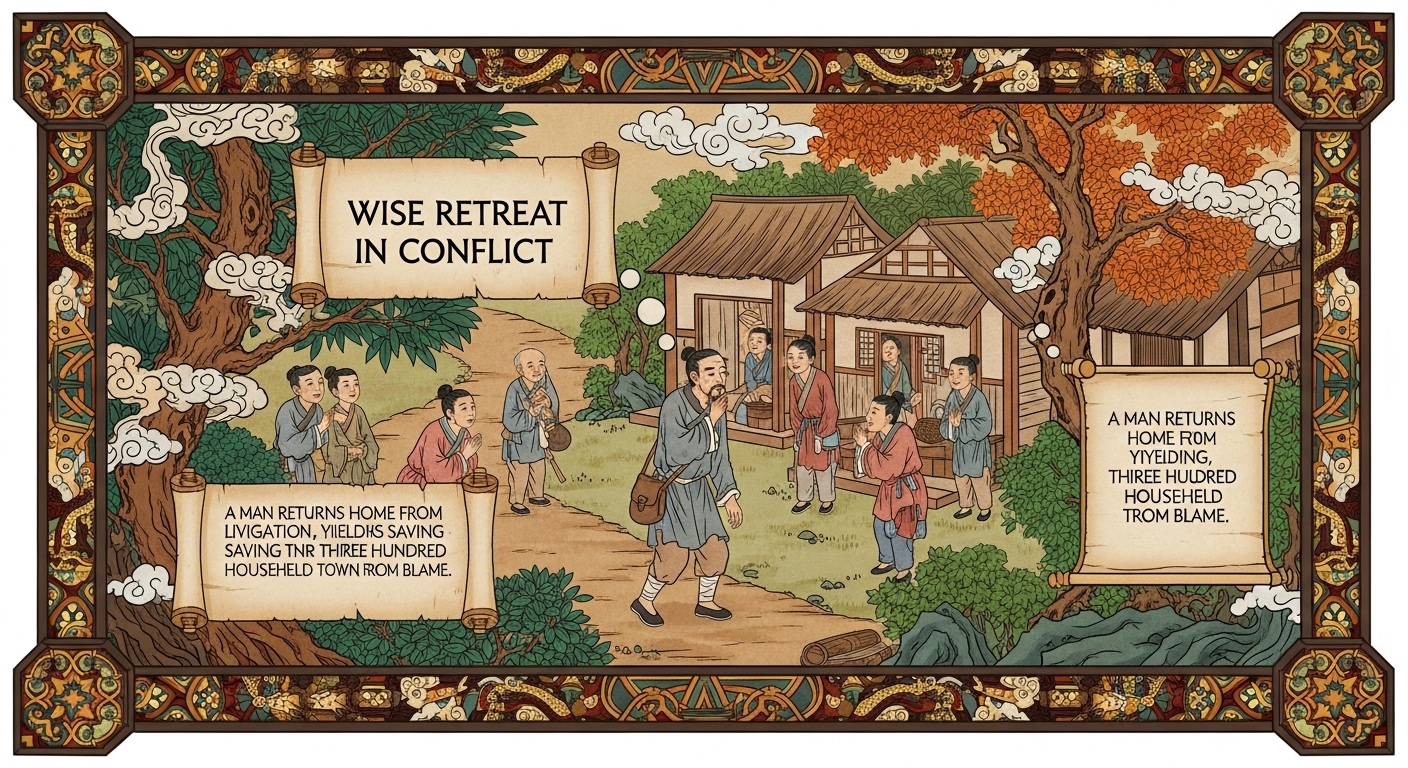
Second Line (Nine in the Second Place): Not prolonging the litigation. He returns and yields. The people of his town, three hundred households, remain free of blame.
This line suggests yielding in conflict to protect one's community from harm.
Matching part in the tale: "Unable to prolong the conflict, he returned home and yielded. His household and the three hundred families in his clan escaped any blame."
Retreating prevents broader damage.
Annotation: I Ching Song hexagram second line: "The second NINE, undivided, shows its subject unequal to the contention. He returns home, and calls in his people—three hundred families—who will preserve themselves from injury."
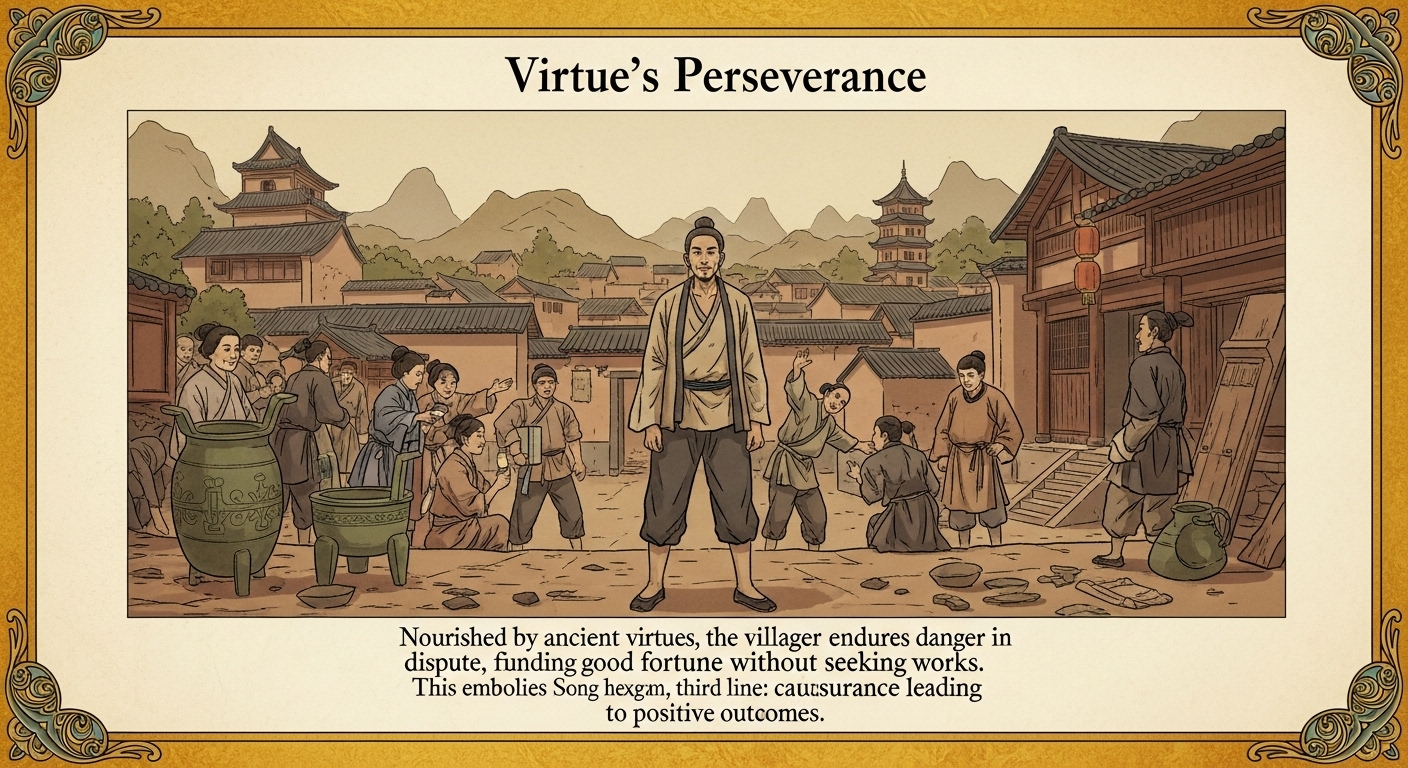
Third Line (Six in the Third Place): Nourishment from what is ancient. Perseverance brings danger. In the end, good fortune. If by chance you are in the service of a king, seek not works.
This line recommends living on old virtues during conflict, persevering cautiously without seeking glory.
Matching part in the tale: "Another villager, relying on old virtues for sustenance, persevered in the dispute but faced danger. In the end, he found good fortune by not seeking grand achievements, even if serving the king."
Humility in peril leads to fortune.
Annotation:I Ching Song hexagram third line: "The third SIX, divided, shows its subject with the appearance of being adorned (by the upper trigram). He is persevering in the maintenance of his purpose, even though it be dangerous. In the end there will be good fortune. If by chance he be engaged in the king's service, he will not achieve merit."
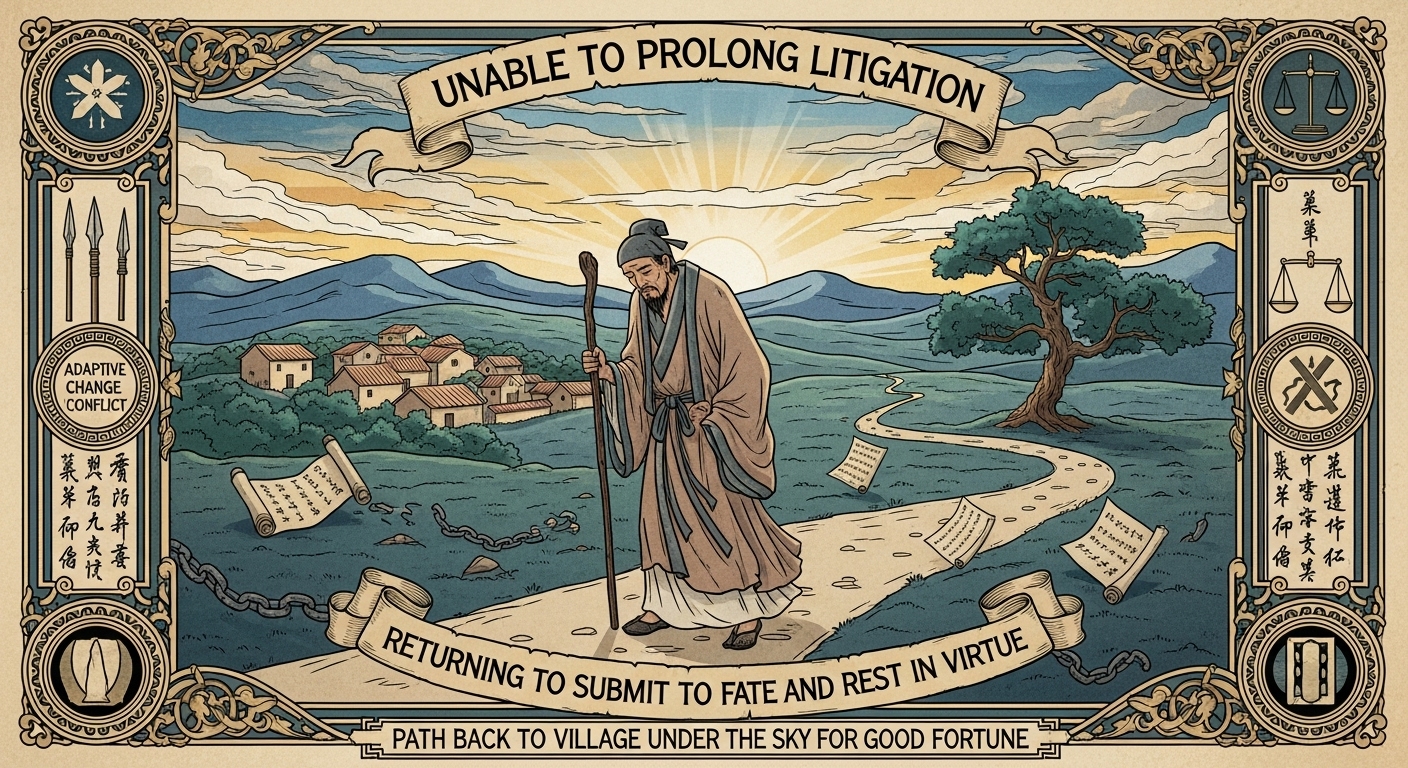
Fourth Line (Nine in the Fourth Place): Not prolonging the litigation. He goes back and submits to fate, changes the mandate, rests in virtue. Good fortune.
This line indicates returning from conflict, accepting fate, and changing course for peace.
Matching part in the tale: "A fourth man couldn't continue the litigation; he went back, accepted fate, changed his approach, and rested in virtue, leading to good fortune."
Submission brings resolution.
Annotation:I Ching Song hexagram fourth line: "The fourth NINE, undivided, shows its subject unequal to the contention. He returns to (the study of Heaven's) ordinances, changes (his wish to contend), and rests in being firm and correct. There will be good fortune."
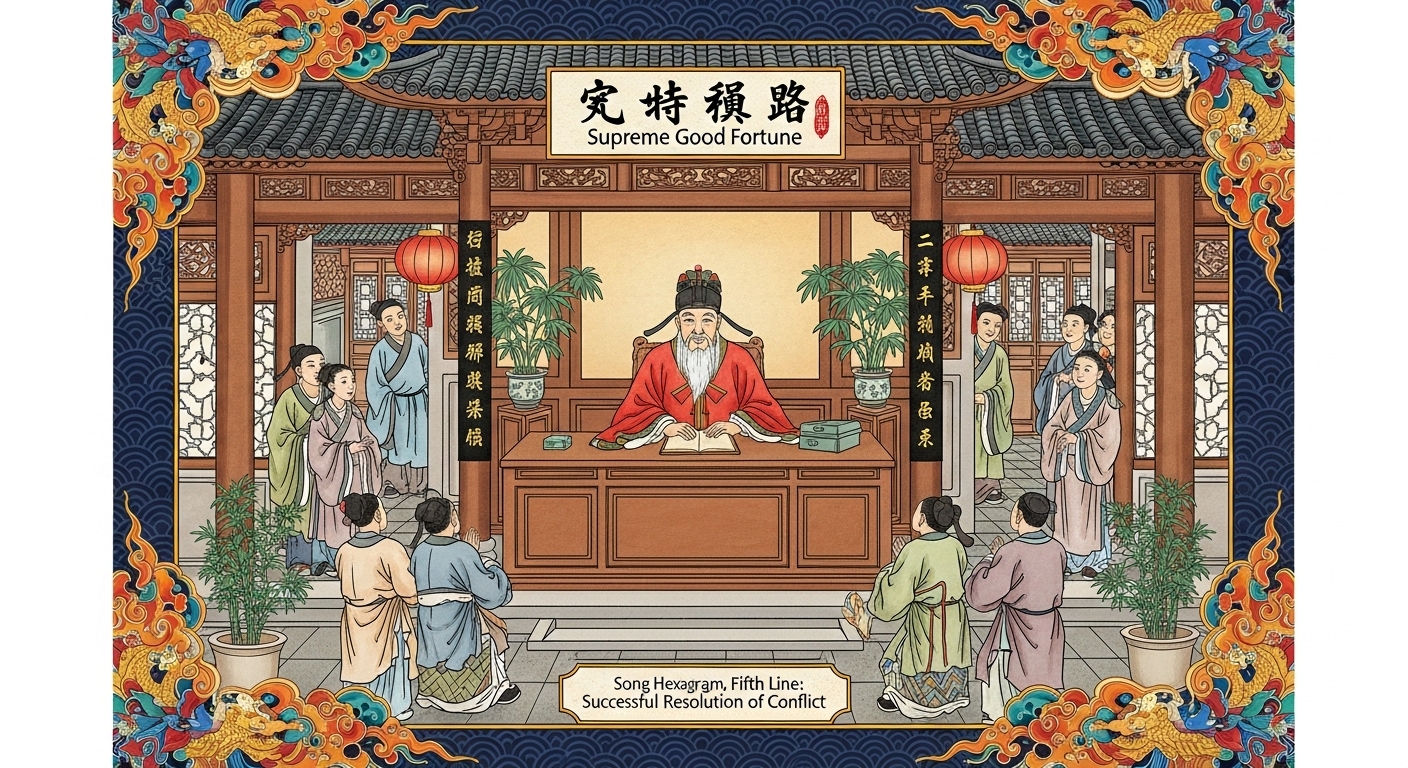
Fifth Line (Nine in the Fifth Place): Litigation. Supreme good fortune.
This line represents supreme success in handling conflict from a central position.
Matching part in the tale: "In the center, a wise judge handled the litigation supremely, bringing great good fortune to all involved."
Centered judgment resolves disputes well.
Annotation: I Ching Song hexagram fifth line: "The fifth NINE, undivided, shows its subject contending—and with great good fortune."

Top Line (Nine at the Top): Even if by chance a leather belt is bestowed on one, by the end of a morning it will have been snatched away three times.
This line warns that gains from conflict are temporary and unstable.
Matching part in the tale: "At the peak, even if a leather belt of honor was bestowed upon one party, by morning's end, it was snatched away three times, showing the fleeting nature of disputed gains."
Victories in disputes don't last.
Annotation: I Ching Song hexagram top line: "The topmost NINE, undivided, shows how its subject may have the leather belt conferred on him (by the sovereign). By the end of the day it will have been snatched from him three times."
This blog should make the six lines of Song hexagram feel more approachable! The I Ching is full of life wisdom. Share your thoughts in the comments. See you next time~ 😊
'사서삼경' 카테고리의 다른 글
| Eighth Hexagram : The Wisdom of Holding Together (0) | 2025.09.10 |
|---|---|
| Seventh Hexagram Shi with an Ancient Tale: The Wisdom of The Army (0) | 2025.09.09 |
| 수천수 : 기다림의 지혜 (2) | 2025.09.07 |
| 산수몽 : 무지에서 깨달음으로 (0) | 2025.09.06 |
| 수뢰둔 : 어려운 시작의 교훈 (0) | 2025.09.05 |



